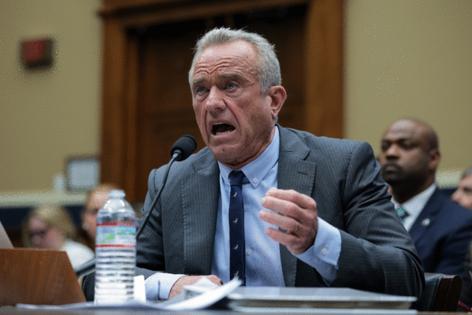Mihir Sharma: RFK Jr. is playing with babies' lives
Published in Op Eds
When Robert F. Kennedy Jr. was appointed secretary of health and human services, everyone knew he was capable of doing great damage. He had a long history of indulging conspiracy theories, particularly when it came to vaccines.
Already, his attempt to reassess immunization schedules in the U.S. has outraged pediatricians. But his latest broadside against science, a decision to withdraw U.S. funding from the global vaccine alliance GAVI, may kill far more children than anything he has so far tried at home.
The Global Alliance for Vaccines and Immunization, designed in cooperation between the U.S. and U.K. governments, as well as philanthropic organizations — particularly Bill and Melinda Gates’ foundation — was set up in 2000. Its mandate has been to increase access to vaccines for children whose families cannot afford them, primarily in the Global South. GAVI could have done more, especially during the COVID-19 pandemic, but even so it is fair to describe it as one of the few great success stories for international collaboration in the past few decades.
It's worth taking a moment to examine exactly how effective it has been at saving lives through its sustained focus on routine childhood vaccinations. One study published in the British Medical Journal calculated that its support for immunization programs across the world had reduced infant mortality rates by over 9% and under-fives by 12%.
During the pandemic, GAVI helped set up and administer the COVAX system for vaccine distribution to poorer countries. This took a while to get started, but eventually delivered two billion doses of various COVID-19 shots, saving hundreds of thousands, possibly millions, of lives.
Initially, the Global South saw the developed world hog far more doses than they needed — Canada, a country of 40 million, had reserved 154 million doses by December of 2020 — while most other countries had simply no way to access any shots at all. GAVI, through COVAX, played a central role in addressing this shocking disparity.
Kennedy’s decision to end support to one of America’s few remaining positive interventions in the Global South is both immoral and dangerous. It will cause resentment about inequities in worldwide healthcare access to spread and further damage U.S. standing abroad when compared to countries like China. Kennedy’s deference to conspiracy theories and nativism will cost children their lives. It may even wind up being worse than the decision to stop funding USAID programs, which has already led to chaos in some of the poorest parts of the world. (A study published in The Lancet predicted those cuts could result in more than 14 million extra deaths globally by 2030.)
But it will hurt the U.S. as well. Not just because Americans cannot insulate themselves completely from an unhealthy world — the pandemic taught us that. But also because GAVI was designed around the principles of the market, and respect for intellectual property rights, institutions that serve U.S. companies and consumers most of all.
Critics argue that it is far too respectful of property rights and the profit motive. The charity Médecins Sans Frontières, for example, has complained that GAVI pays too much to the rights-holders and developers of vaccines, instead of to generics manufacturers, and that means that it costs more to immunize each child than it needs to. (Still, MSF acknowledges that half of the vaccinations it delivers every year are bought with GAVI money, and responded to Kennedy’s withdrawal of funding by saying that now, “countless children will die from vaccine-preventable diseases.”)
The fact is that if GAVI goes, then so will many countries’ incentives to respect intellectual property rights in the healthcare sector. The last thing that U.S. companies — not just in pharmaceuticals, but across the board — need is for the future centers of economic growth in the Global South to take a pick-and-choose approach to paying rights holders.
And all of us will be hurt if new and innovative medicines aren’t developed because the global norms around rights and payments change. If Kennedy is allowed to follow his anti-science instincts then the U.S. will be left unhealthier, less respected and poorer — and a million children in the rest of the world will never live to see adulthood.
_____
This column reflects the personal views of the author and does not necessarily reflect the opinion of the editorial board or Bloomberg LP and its owners.
Mihir Sharma is a Bloomberg Opinion columnist. A senior fellow at the Observer Research Foundation in New Delhi, he is author of “Restart: The Last Chance for the Indian Economy.”
_____
©2025 Bloomberg L.P. Visit bloomberg.com/opinion. Distributed by Tribune Content Agency, LLC.

























































Comments